Friends, if you’re searching for “Bible Verses About Who Will Go To Hell,” this content is for you. Today, I share Bible verses that will help you better understand this topic according to the Bible. These scriptures offer insight into the eternal consequences of sin and rejection of God’s salvation. While the subject may be sobering, these verses aim to provide clarity on what the Bible says about hell and those who may face judgment. Let’s explore what the Word reveals about this challenging topic.
Contents
- 1 What Does the Bible Say About Hell and Eternal Punishment?
- 2 Biblical Criteria for Who Goes to Hell According to Scripture
- 2.1 Galatians 5:19-21 – Acts of flesh hinder inheriting God’s kingdom
- 2.2 Revelation 21:8 – Sinners, unbelievers, and immoral face eternal punishment
- 2.3 Matthew 7:21 – Only those doing God’s will enter heaven
- 2.4 John 3:18 – Belief in Jesus saves; disbelief condemns
- 2.5 1 Corinthians 6:9-10 – Unrighteous will not inherit God’s kingdom
- 3 Jesus’ Teachings About Hell and Salvation in the New Testament
- 3.1 Matthew 10:28 – Fear God who can destroy soul and body in hell
- 3.2 Luke 16:23 – Rich man in torment, sees Lazarus in comfort
- 3.3 Matthew 5:22 – Anger and insult lead to judgment and hell
- 3.4 Mark 9:43-44 – Avoid sin to escape hell’s unquenchable fire
- 3.5 John 3:16 – Eternal life through belief in God’s Son
- 4 Old Testament Verses About Judgment and the Afterlife
- 4.1 Daniel 12:2 – Resurrection to everlasting life or shame and contempt
- 4.2 Isaiah 66:24 – Unquenchable fire for the wicked after judgment
- 4.3 Psalm 9:17 – Wicked’s fate is hell, nations forgetting God perish
- 4.4 Ezekiel 18:20 – Each person responsible for their own sin
- 4.5 Proverbs 15:24 – Path of life leads upward, avoiding hell below
- 5 Can Someone Avoid Hell? Bible Verses About Redemption and Forgiveness
- 5.1 1 John 1:9 – Confession and forgiveness cleanse from unrighteousness
- 5.2 Romans 10:9 – Confess Jesus as Lord for salvation and avoid hell
- 5.3 Ephesians 1:7 – Redemption through Christ’s blood, forgiveness of sins
- 5.4 Acts 3:19 – Repentance brings forgiveness, leads to refreshing from God
- 5.5 Titus 3:5 – Saved by mercy, not by righteous deeds
- 5.6 2 Peter 3:9 – God’s patience allows time for repentance
- 6 Common Misconceptions About Hell Based on Biblical Context
- 7 How Different Christian Denominations Interpret Hell and Damnation
- 8 The Role of Faith, Works, and Grace in Determining Eternal Destiny
- 8.1 Ephesians 2:8-9 – Salvation by grace through faith, not works
- 8.2 James 2:26 – Faith without works is dead
- 8.3 Romans 5:1 – Justified by faith, peace with God through Jesus
- 8.4 Galatians 2:16 – Justification by faith, not law, through Christ
- 8.5 Philippians 2:12 – Work out salvation with fear and trembling
What Does the Bible Say About Hell and Eternal Punishment?
When discussing eternal punishment, it can be a sobering topic. Many people wonder what the Bible says about hell and what it means for those who do not follow God’s path. The Bible offers insights into the nature of hell, often describing it as a place of separation from God. It’s important to explore these scriptures with an open heart, seeking understanding and compassion.
Matthew 25:46 – Eternal punishment for the unrighteous, eternal life for the righteous

These shall go away into everlasting punishment: but the righteous into life eternal
Matthew 25:46
Explanation:- This verse highlights the stark contrast between the destinies of the righteous and the unrighteous. It underscores the concept of eternal consequences: the unrighteous face eternal punishment, while the righteous receive eternal life, emphasizing the importance of one’s choices and actions in life.
Revelation 20:15 – Not in Book of Life, cast into fire

Whosoever was not found written in the book of life was cast into the lake of fire
Revelation 20:15
Explanation:- Revelation 20:15 highlights the seriousness of eternal judgment, stating that those not found in the Book of Life face eternal punishment. This verse underscores the importance of salvation and the consequences of rejecting it, urging reflection on one’s spiritual standing.
2 Thessalonians 1:9 – Everlasting destruction away from God’s presence

Who shall be punished with everlasting destruction from the presence of the Lord, from the glory of his power
2 Thessalonians 1:9
Explanation:- This verse underscores the severe consequence of rejecting God: eternal separation from His presence. It highlights the reality of hell as a place of everlasting destruction, emphasizing the seriousness of turning away from God’s love and truth.
Matthew 13:50 – Wicked cast into fiery furnace, eternal punishment awaits

Shall cast them into the furnace of fire: there shall be wailing gnashing of teeth
Matthew 13:50
Explanation:- This verse vividly portrays the fate of the wicked, emphasizing the reality of hell as a place of fiery punishment and eternal separation from God. It serves as a solemn warning about the consequences of rejecting divine truth and righteousness.
Biblical Criteria for Who Goes to Hell According to Scripture
God’s word provides guidance on who might face eternal separation from Him. It’s not just about actions but also the state of one’s heart and relationship with God. The Bible emphasizes the importance of faith and repentance. These criteria are not meant to instill fear but to encourage reflection and a deeper connection with the divine.
Galatians 5:19-21 – Acts of flesh hinder inheriting God’s kingdom
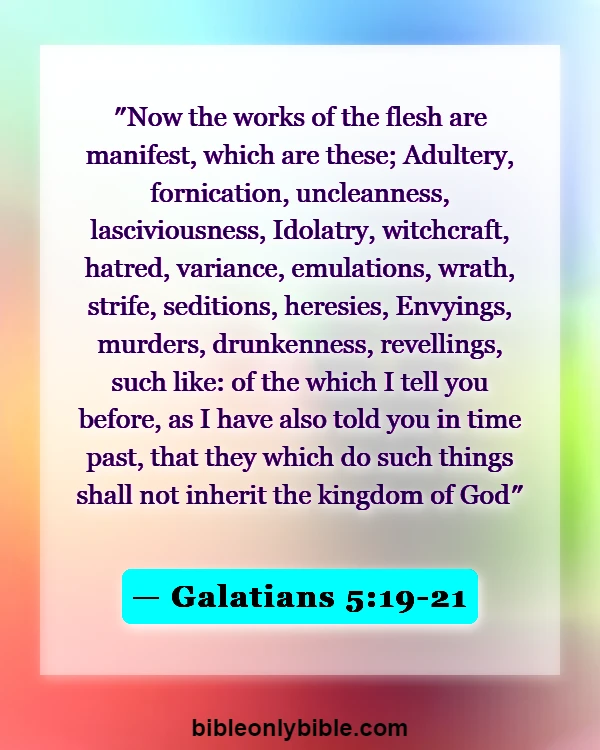
Now the works of the flesh are manifest, which are these; Adultery, fornication, uncleanness, lasciviousnessIdolatry, witchcraft, hatred, variance, emulations, wrath, strife, seditions, heresiesEnvyings, murders, drunkenness, revellings, such like: of the which I tell you before, as I have also told you in time past, that they which do such things shall not inherit the kingdom of God
Galatians 5:19-21
Explanation:- This passage outlines behaviors that prevent inheriting God’s kingdom, highlighting actions like immorality, idolatry, and envy. These acts of the flesh serve as a warning against living contrary to spiritual values, emphasizing the importance of aligning one’s life with the fruits of the Spirit.
Revelation 21:8 – Sinners, unbelievers, and immoral face eternal punishment
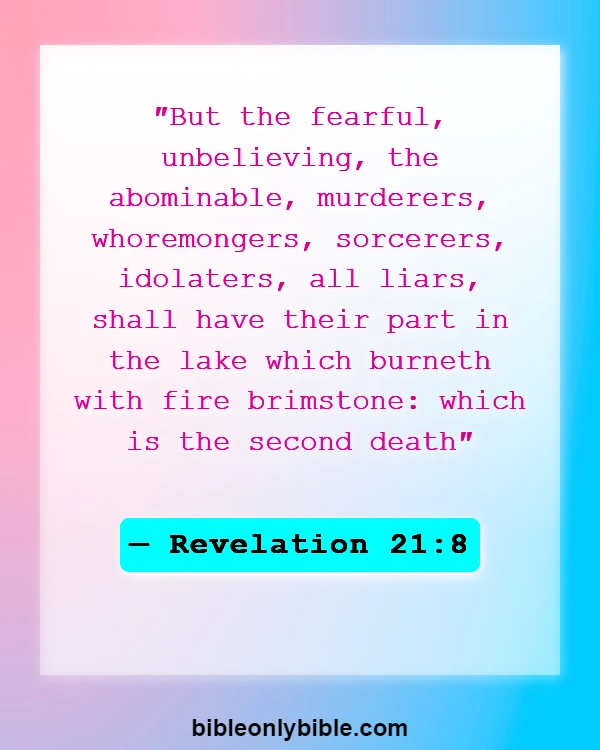
But the fearful, unbelieving, the abominable, murderers, whoremongers, sorcerers, idolaters, all liars, shall have their part in the lake which burneth with fire brimstone: which is the second death
Revelation 21:8
Explanation:- This verse underscores the seriousness of sin and unbelief, warning that those who engage in immoral behaviors, reject faith, or live deceitfully face eternal separation from God. It serves as a call to repentance and faithfulness, urging believers to align their lives with God’s teachings.
Matthew 7:21 – Only those doing God’s will enter heaven

Not every one that saith unto me, Lord, Lord, shall enter into the kingdom of heaven; but he that doeth the will of my Father which is in heaven
Matthew 7:21
Explanation:- This verse highlights that merely professing faith is not enough for salvation. Instead, true entry into heaven requires actively doing God’s will. It emphasizes the importance of genuine obedience and action over mere words in one’s spiritual journey.
John 3:18 – Belief in Jesus saves; disbelief condemns
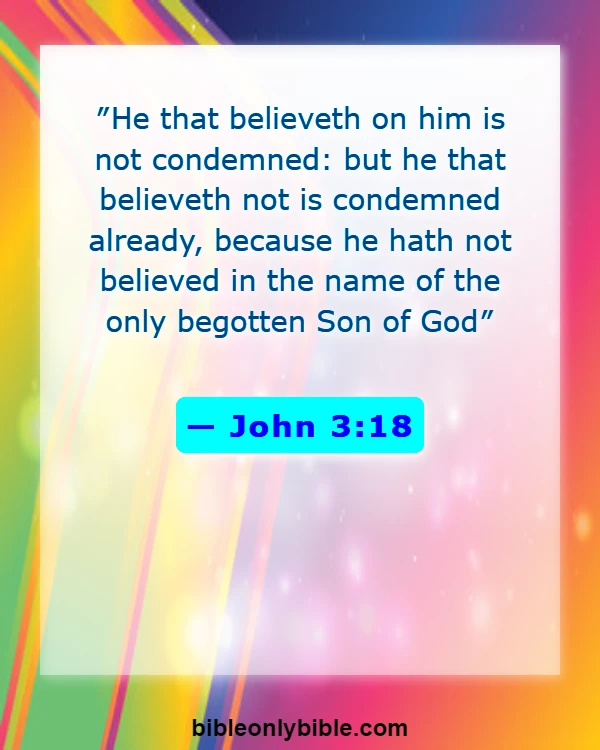
He that believeth on him is not condemned: but he that believeth not is condemned already, because he hath not believed in the name of the only begotten Son of God
John 3:18
Explanation:- In the verse, belief in Jesus is highlighted as the path to salvation, while disbelief results in condemnation. It underscores the importance of faith in Jesus as the determining factor for eternal destiny, presenting belief as the key to avoiding judgment.
1 Corinthians 6:9-10 – Unrighteous will not inherit God’s kingdom

Know ye not that the unrighteous shall not inherit the kingdom of God? Be not deceived: neither fornicators, nor idolaters, nor adulterers, nor effeminate, nor abusers of themselves with mankindNor thieves, nor covetous, nor drunkards, nor revilers, nor extortioners, shall inherit the kingdom of God
1 Corinthians 6:9-10
Explanation:- This passage outlines behaviors deemed unrighteous, stressing that those who engage in such acts will not inherit God’s kingdom. It serves as a warning, encouraging believers to pursue righteousness and align their lives with God’s teachings, highlighting the importance of moral integrity.
Jesus’ Teachings About Hell and Salvation in the New Testament
Jesus spoke of both hell and salvation, offering a path to eternal life through Him. His teachings highlight the importance of love, forgiveness, and choosing the narrow path that leads to life. By following His teachings, we find hope and an invitation to a life with God. Exploring these scriptures can bring clarity and peace to our spiritual journey.
Matthew 10:28 – Fear God who can destroy soul and body in hell

Fear not them which kill the body, but are not able to kill the soul: but rather fear him which is able to destroy both soul body in hell
Matthew 10:28
Explanation:- This verse highlights the importance of fearing God, who has the ultimate authority over both soul and body. It underscores the reality of hell and serves as a reminder to prioritize spiritual well-being and seek salvation through faith in Jesus’ teachings.
Luke 16:23 – Rich man in torment, sees Lazarus in comfort
In hell he lift up his eyes, being in torments, seeth Abraham afar off, Lazarus in his bosom
Luke 16:23
Explanation:- In this verse, the rich man experiences torment in Hades while observing Lazarus in comfort by Abraham’s side. It highlights the stark contrast between earthly wealth and true spiritual riches, underscoring Jesus’ teachings on the consequences of ignoring the needs of others.
Matthew 5:22 – Anger and insult lead to judgment and hell
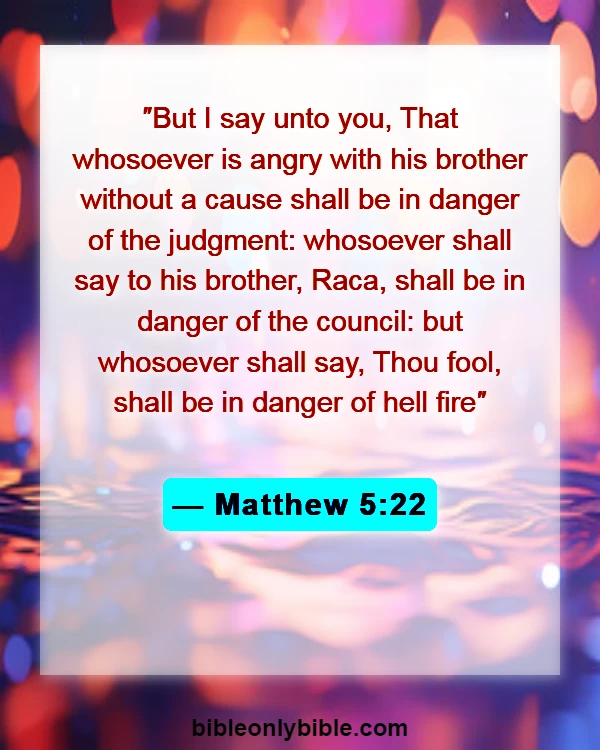
But I say unto you, That whosoever is angry with his brother without a cause shall be in danger of the judgment: whosoever shall say to his brother, Raca, shall be in danger of the council: but whosoever shall say, Thou fool, shall be in danger of hell fire
Matthew 5:22
Explanation:- In this verse, Jesus warns that anger and insults towards others can lead to severe spiritual consequences, including judgment and hell. It underscores the importance of controlling one’s anger and treating others with respect to align with the path of salvation.
Mark 9:43-44 – Avoid sin to escape hell’s unquenchable fire
If thy hand offend thee, cut it off: it is better for thee to enter into life maimed, than having two hands to go into hell, into the fire that never shall be quenchedWhere their worm dieth not, the fire is not quenched
Mark 9:43-44
Explanation:- In this passage, Jesus underscores the severity of sin and its consequences. He teaches that it’s better to make significant sacrifices to avoid sin than to face the eternal punishment of hell. This highlights the importance of pursuing righteousness and prioritizing spiritual well-being.
John 3:16 – Eternal life through belief in God’s Son

For God so loved the world, that he gave his only begotten Son, that whosoever believeth in him should not perish, but have everlasting life
John 3:16
Explanation:- This verse highlights the promise of eternal life through faith in God’s Son, underscoring salvation’s accessibility to all believers. It contrasts with the theme of hell by offering redemption and hope, emphasizing God’s love and the importance of belief for salvation.
Old Testament Verses About Judgment and the Afterlife
The Old Testament gives us glimpses into the themes of judgment and the afterlife. It illustrates the consequences of turning away from God and the blessings of walking in His ways. Understanding these scriptures helps us appreciate the continuity of God’s message throughout the Bible, reminding us of His justice and mercy.
Daniel 12:2 – Resurrection to everlasting life or shame and contempt

Many of them that sleep in the dust of the earth shall awake, some to everlasting life, some to shame everlasting contempt
Daniel 12:2
Explanation:- This verse highlights the dual outcome of resurrection, where some will awaken to eternal life and others to disgrace and eternal contempt. It underscores the theme of divine judgment, emphasizing the distinct destinies awaiting individuals based on their lives and choices.
Isaiah 66:24 – Unquenchable fire for the wicked after judgment

They shall go forth, look upon the carcases of the men that have transgressed against me: for their worm shall not die, neither shall their fire be quenched; they shall be an abhorring unto all flesh
Isaiah 66:24
Explanation:- Isaiah 66:24 depicts the fate of the wicked after judgment, highlighting their eternal punishment in unquenchable fire. This imagery underscores the seriousness of divine judgment and serves as a stark warning about the consequences of rejecting God’s ways, emphasizing the finality and severity of divine justice.
Psalm 9:17 – Wicked’s fate is hell, nations forgetting God perish
The wicked shall be turned into hell, all the nations that forget God
Psalm 9:17
Explanation:- This verse underscores the fate of the wicked and nations that forget God, highlighting a theme of divine judgment and accountability. It serves as a reminder that turning away from God leads to spiritual ruin, emphasizing the importance of living a life aligned with God’s teachings.
Ezekiel 18:20 – Each person responsible for their own sin

The soul that sinneth, it shall die. The son shall not bear the iniquity of the father, neither shall the father bear the iniquity of the son: the righteousness of the righteous shall be upon him, the wickedness of the wicked shall be upon him
Ezekiel 18:20
Explanation:- This verse highlights individual accountability for sin, emphasizing that each person is responsible for their own actions and consequences. It underscores the principle of personal responsibility in judgment, rejecting the idea of inherited guilt or punishment for another’s sins.
Proverbs 15:24 – Path of life leads upward, avoiding hell below

The way of life is above to the wise, that he may depart from hell beneath
Proverbs 15:24
Explanation:- This verse highlights the importance of living wisely and righteously, as it leads one upward toward eternal life and away from the consequences of hell. It underscores the significance of choosing a path that aligns with divine wisdom to avoid spiritual downfall.
Can Someone Avoid Hell? Bible Verses About Redemption and Forgiveness
The Bible reassures us that redemption and forgiveness are possible through faith in Christ. God’s grace is available to all who seek Him sincerely. These verses remind us that no matter our past, we can embrace a new beginning in Christ. It’s a message of hope and transformation, encouraging us to seek God’s forgiveness and love.
1 John 1:9 – Confession and forgiveness cleanse from unrighteousness

If we confess our sins, he is faithful just to forgive us our sins, to cleanse us from all unrighteousness
1 John 1:9
Explanation:- This verse highlights that confession and seeking forgiveness from God lead to cleansing from unrighteousness. It reassures believers that through honest acknowledgment of sins and God’s grace, redemption is possible, offering a path away from the consequences of sin, including hell.
Romans 10:9 – Confess Jesus as Lord for salvation and avoid hell

That if thou shalt confess with thy mouth the Lord Jesus, shalt believe in thine heart that God hath raised him from the dead, thou shalt be saved
Romans 10:9
Explanation:- Confessing Jesus as Lord and believing in His resurrection grants salvation, offering a path to avoid hell. This verse highlights the power of faith and declaration in securing redemption and forgiveness, emphasizing the importance of a personal relationship with Christ for eternal life.
Ephesians 1:7 – Redemption through Christ’s blood, forgiveness of sins

In whom we have redemption through his blood, the forgiveness of sins, according to the riches of his grace
Ephesians 1:7
Explanation:- Ephesians 1:7 highlights the profound gift of redemption and forgiveness available through Christ’s sacrifice. It reassures believers that through His blood, sins are forgiven, offering a path to avoid hell by embracing the grace and redemption that Jesus provides.
Acts 3:19 – Repentance brings forgiveness, leads to refreshing from God

Repent ye therefore, be converted, that your sins may be blotted out, when the times of refreshing shall come from the presence of the Lord
Acts 3:19
Explanation:- Repentance leads to divine forgiveness and spiritual renewal. Turning away from sin and seeking God’s forgiveness opens the door to redemption. This transformative process offers hope, allowing believers to experience a refreshing presence from God, symbolizing a new beginning and a path away from condemnation.
Titus 3:5 – Saved by mercy, not by righteous deeds
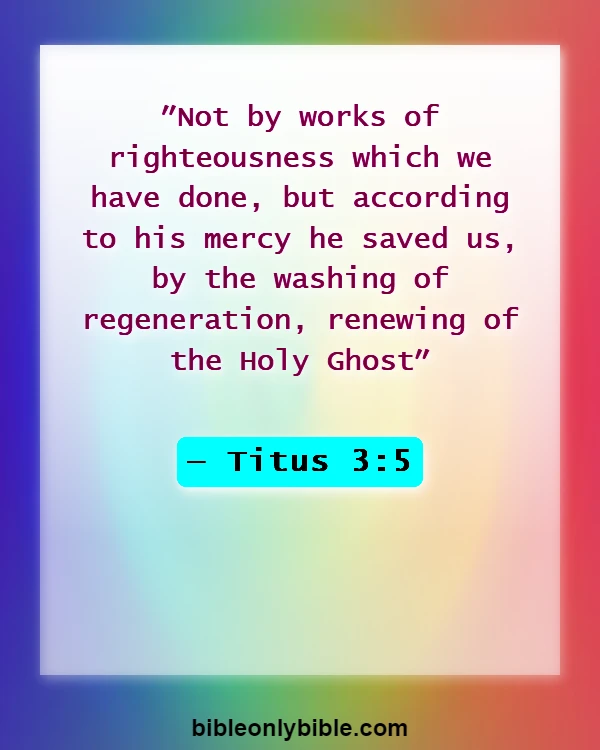
Not by works of righteousness which we have done, but according to his mercy he saved us, by the washing of regeneration, renewing of the Holy Ghost
Titus 3:5
Explanation:- This verse highlights that salvation comes through God’s mercy, not by our righteous actions. It underscores the transformative power of spiritual rebirth and renewal by the Holy Spirit, emphasizing that redemption and forgiveness are divine gifts rather than something we can earn.
2 Peter 3:9 – God’s patience allows time for repentance

The Lord is not slack concerning his promise, as some men count slackness; but is longsuffering to us-ward, not willing that any should perish, but that all should come to repentance
2 Peter 3:9
Explanation:- This verse highlights God’s patience and desire for everyone to repent and find redemption. It assures us that God is not slow in fulfilling His promises but instead offers grace and time for all to turn away from sin and embrace forgiveness.
Common Misconceptions About Hell Based on Biblical Context
Misunderstandings about hell can arise when scriptures are taken out of context. The Bible encourages us to seek wisdom and understanding, helping us distinguish cultural myths from biblical truths. By studying scripture holistically, we gain a clearer picture of God’s intentions and the reality of hell, fostering a more informed faith journey.
Matthew 25:41 – Eternal fire prepared for the devil and his angels

Then shall he say also unto them on the left hand, Depart from me, ye cursed, into everlasting fire, prepared for the devil his angels
Matthew 25:41
Explanation:- This verse highlights that eternal fire is specifically prepared for the devil and his angels, underscoring that hell’s primary purpose is for their punishment. It challenges common misconceptions by emphasizing that humans join them by choice, not original intent, stressing personal responsibility in faith.
2 Peter 2:4 – God judged fallen angels, casting them into darkness

For if God spared not the angels that sinned, but cast them down to hell, delivered them into chains of darkness, to be reserved unto judgment
2 Peter 2:4
Explanation:- This verse highlights God’s judgment on fallen angels, illustrating that divine justice extends even to celestial beings. It underscores the seriousness of sin and the reality of divine retribution, serving as a cautionary reminder of the consequences of rebelling against God.
Jude 1:7 – Eternal fire for immorality, as Sodom and Gomorrah

Even as Sodom Gomorrha, the cities about them in like manner, giving themselves over to fornication, going after strange flesh, are set forth for an example, suffering the vengeance of eternal fire
Jude 1:7
Explanation:- Jude 1:7 highlights the fate of Sodom and Gomorrah as a warning against immorality, underscoring eternal fire as a consequence. This verse challenges common misconceptions about hell by emphasizing divine justice and the seriousness of moral transgressions.
Revelation 14:11 – Endless torment for worshippers of the beast

The smoke of their torment ascendeth up for ever ever: they have no rest day nor night, who worship the beast his image, whosoever receiveth the mark of his name
Revelation 14:11
Explanation:- This verse highlights the eternal consequences for those who worship the beast, emphasizing the seriousness of idolatry and allegiance against God. Common misconceptions may arise from interpreting “endless torment” literally rather than understanding it as a powerful warning against rejecting God’s sovereignty.
How Different Christian Denominations Interpret Hell and Damnation
Christian denominations vary in their interpretations of hell, reflecting diverse theological perspectives. While core beliefs remain, differences often arise in understanding the nature and duration of hell. It’s essential to approach these discussions with respect, valuing the richness of Christian tradition while seeking truth through dialogue and study.
Mark 9:48 – Unquenchable fire where the worm never dies

Where their worm dieth not, the fire is not quenched
Mark 9:48
Explanation:- This verse vividly describes hell as a place of perpetual torment, symbolized by unending fire and undying worms. Different Christian denominations interpret these images either literally or metaphorically, signifying eternal separation from God and the enduring consequences of sin.
The Role of Faith, Works, and Grace in Determining Eternal Destiny
The Bible teaches that faith, works, and grace all play roles in our eternal destiny. Faith in Jesus is the foundation, while works reflect our faith in action. Grace is God’s gift, enabling us to grow and serve. Together, they form a holistic approach to understanding salvation, inviting us to live lives that honor God and reflect His love.
Ephesians 2:8-9 – Salvation by grace through faith, not works

For by grace are ye saved through faith; that not of yourselves: it is the gift of GodNot of works, lest any man should boast
Ephesians 2:8-9
Explanation:- This verse emphasizes that salvation is a gift from God, granted through faith and not earned by works. It highlights that grace, not human effort, is the key to eternal life, underscoring that divine mercy, rather than personal merit, determines destiny.
James 2:26 – Faith without works is dead

For as the body without the spirit is dead, so faith without works is dead also
James 2:26
Explanation:- This verse highlights the necessity of combining faith with action. Genuine faith manifests through deeds, illustrating that belief alone is insufficient for salvation. It suggests that a living faith is demonstrated by works, which play a crucial role in one’s eternal destiny alongside grace.
Romans 5:1 – Justified by faith, peace with God through Jesus

Therefore being justified by faith, we have peace with God through our Lord Jesus Christ
Romans 5:1
Explanation:- This verse highlights that faith in Jesus leads to justification and peace with God. It underscores the importance of faith over mere works, emphasizing that grace through Jesus is the foundation for salvation, shaping the believer’s eternal destiny.
Galatians 2:16 – Justification by faith, not law, through Christ
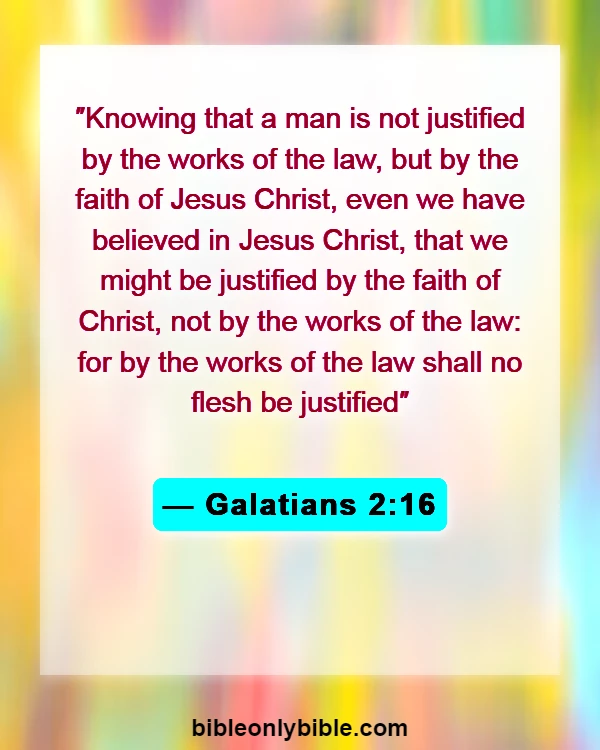
Knowing that a man is not justified by the works of the law, but by the faith of Jesus Christ, even we have believed in Jesus Christ, that we might be justified by the faith of Christ, not by the works of the law: for by the works of the law shall no flesh be justified
Galatians 2:16
Explanation:- This verse underscores that justification and salvation come through faith in Jesus Christ, not by adhering to the law. It highlights the crucial role of faith and grace, rather than human efforts or works, in determining one’s eternal destiny.
Philippians 2:12 – Work out salvation with fear and trembling

Wherefore, my beloved, as ye have always obeyed, not as in my presence only, but now much more in my absence, work out your own salvation with fear trembling
Philippians 2:12
Explanation:- This verse highlights the importance of actively living out one’s faith with seriousness and reverence. It underscores the interplay between faith, works, and grace in salvation, encouraging believers to diligently pursue their spiritual growth while relying on God’s grace.
